The Cambridge History of China. Vol. 12: Republican China, 1912-1949, Part 1
Подождите немного. Документ загружается.

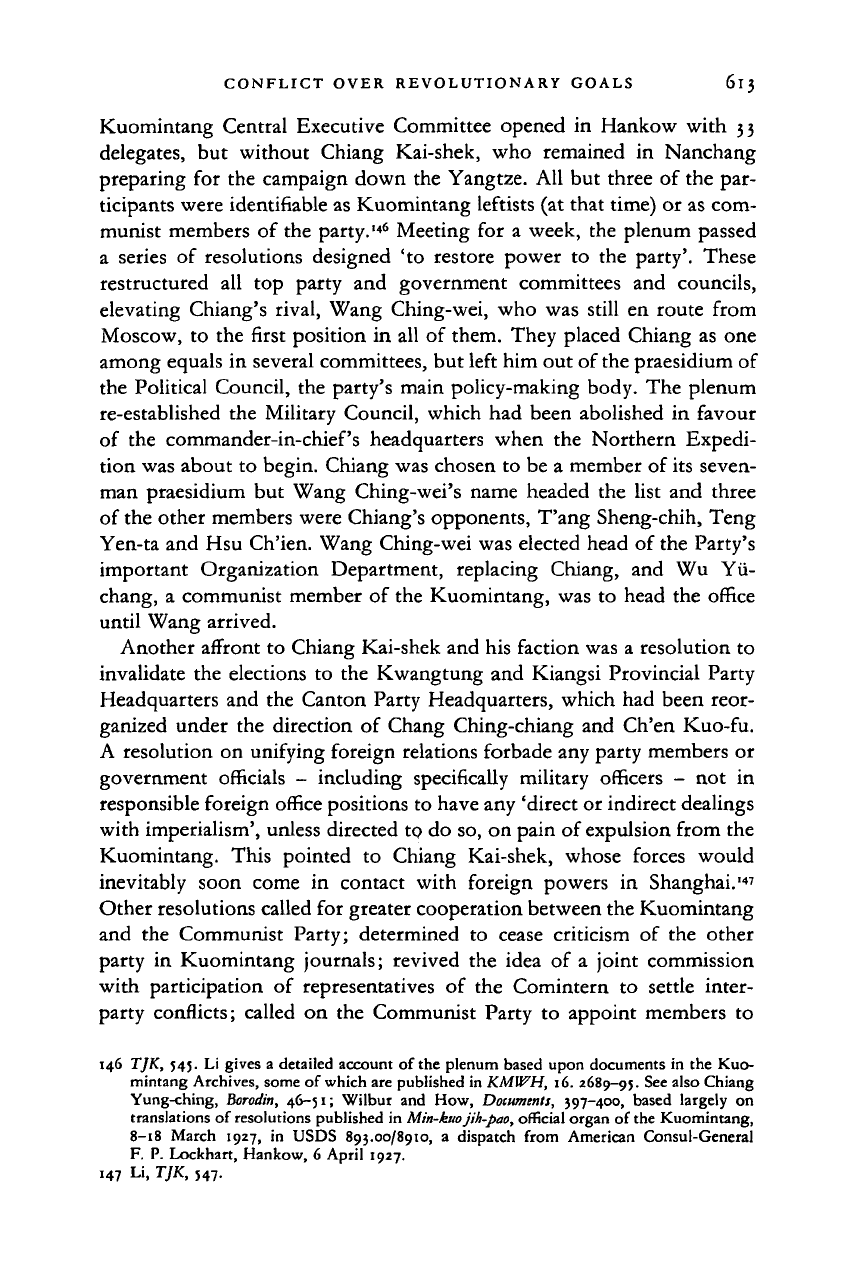
CONFLICT OVER REVOLUTIONARY GOALS
613
Kuomintang Central Executive Committee opened
in
Hankow with
33
delegates,
but
without Chiang Kai-shek,
who
remained
in
Nanchang
preparing
for the
campaign down
the
Yangtze.
All but
three
of the par-
ticipants were identifiable
as
Kuomintang leftists
(at
that time)
or as com-
munist members
of the
party.
146
Meeting
for a
week,
the
plenum passed
a series
of
resolutions designed
'to
restore power
to the
party'. These
restructured
all top
party
and
government committees
and
councils,
elevating Chiang's rival, Wang Ching-wei,
who was
still
en
route from
Moscow,
to the
first position
in all of
them. They placed Chiang
as one
among equals
in
several committees,
but
left
him out of
the praesidium
of
the Political Council,
the
party's main policy-making body.
The
plenum
re-established
the
Military Council, which
had
been abolished
in
favour
of
the
commander-in-chief's headquarters when
the
Northern Expedi-
tion
was
about
to
begin. Chiang
was
chosen
to be a
member
of
its seven-
man praesidium
but
Wang Ching-wei's name headed
the
list
and
three
of the other members were Chiang's opponents, T'ang Sheng-chih, Teng
Yen-ta
and Hsu
Ch'ien. Wang Ching-wei
was
elected head
of the
Party's
important Organization Department, replacing Chiang,
and Wu Yii-
chang,
a
communist member
of the
Kuomintang,
was to
head
the
office
until Wang arrived.
Another affront
to
Chiang Kai-shek
and his
faction
was a
resolution
to
invalidate
the
elections
to the
Kwangtung
and
Kiangsi Provincial Party
Headquarters
and the
Canton Party Headquarters, which
had
been reor-
ganized under
the
direction
of
Chang Ching-chiang
and
Ch'en Kuo-fu.
A resolution
on
unifying foreign relations forbade
any
party members
or
government officials
-
including specifically military officers
- not in
responsible foreign office positions
to
have
any
'direct
or
indirect dealings
with imperialism', unless directed
to do so, on
pain
of
expulsion from
the
Kuomintang. This pointed
to
Chiang Kai-shek, whose forces would
inevitably soon come
in
contact with foreign powers
in
Shanghai.
147
Other resolutions called
for
greater cooperation between
the
Kuomintang
and
the
Communist Party; determined
to
cease criticism
of the
other
party
in
Kuomintang journals; revived
the
idea
of a
joint commission
with participation
of
representatives
of the
Comintern
to
settle inter-
party conflicts; called
on the
Communist Party
to
appoint members
to
146 TJK, 545. Li gives a detailed account of the plenum based upon documents in the Kuo-
mintang Archives, some of which are published in
KMWH,
16. 2689-95. See also Chiang
Yung-ching,
Borodin,
46-51;
Wilbur and How,
Documents,
397-400, based largely on
translations of resolutions published in Min-kuo
jih-pao,
official organ of the Kuomintang,
8-18 March 1927, in USDS 893.00/8910, a dispatch from American Consul-General
F.
P. Lockhart, Hankow, 6 April 1927.
147 Li, TJK, 547-
Cambridge Histories Online © Cambridge University Press, 2008
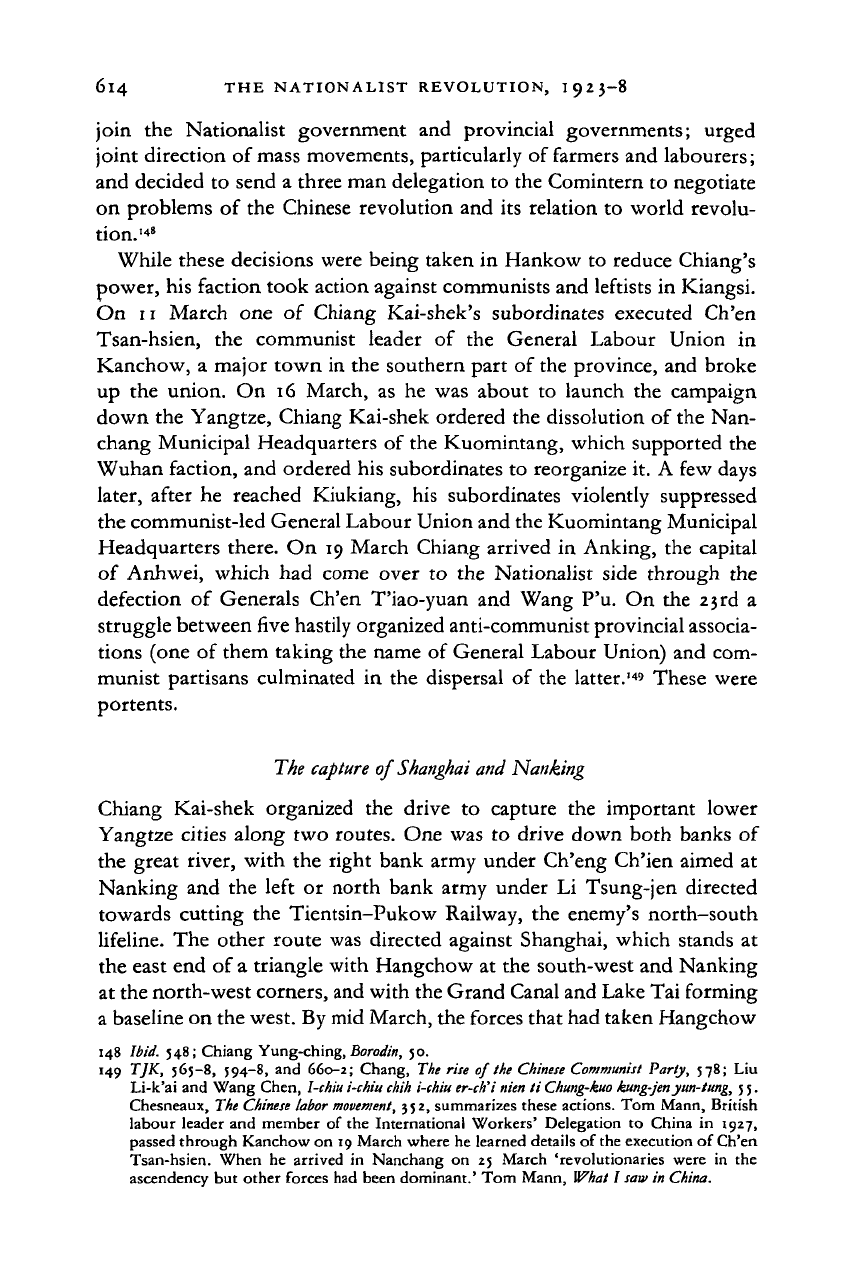
614 THE NATIONALIST REVOLUTION, I 9
2
3-8
join
the
Nationalist government
and
provincial governments; urged
joint direction of mass movements, particularly of farmers and labourers;
and decided to send
a
three man delegation to the Comintern to negotiate
on problems
of
the Chinese revolution and its relation to world revolu-
tion.
148
While these decisions were being taken in Hankow to reduce Chiang's
power, his faction took action against communists and leftists in Kiangsi.
On
11
March one
of
Chiang Kai-shek's subordinates executed Ch'en
Tsan-hsien,
the
communist leader
of the
General Labour Union
in
Kanchow,
a
major town in the southern part of the province, and broke
up
the
union.
On 16
March,
as he
was about
to
launch the campaign
down the Yangtze, Chiang Kai-shek ordered the dissolution of the Nan-
chang Municipal Headquarters of the Kuomintang, which supported the
Wuhan faction, and ordered his subordinates to reorganize it. A few days
later, after he reached Kiukiang,
his
subordinates violently suppressed
the communist-led General Labour Union and the Kuomintang Municipal
Headquarters there.
On
19 March Chiang arrived
in
Anking, the capital
of Anhwei, which had come over
to
the Nationalist side through
the
defection
of
Generals Ch'en T'iao-yuan and Wang P'u. On the 23 rd
a
struggle between five hastily organized anti-communist provincial associa-
tions (one
of
them taking the name of General Labour Union) and com-
munist partisans culminated
in
the dispersal
of
the latter.
149
These were
portents.
The capture of
Shanghai
and Nanking
Chiang Kai-shek organized
the
drive
to
capture
the
important lower
Yangtze cities along two routes. One was
to
drive down both banks of
the great river, with the right bank army under Ch'eng Ch'ien aimed
at
Nanking and the left
or
north bank army under
Li
Tsung-jen directed
towards cutting the Tientsin-Pukow Railway, the enemy's north-south
lifeline. The other route was directed against Shanghai, which stands
at
the east end of a triangle with Hangchow at the south-west and Nanking
at the north-west corners, and with the Grand Canal and Lake Tai forming
a baseline on the west. By mid March, the forces that had taken Hangchow
148
Ibid.
548; Chiang Yung-ching,
Borodin,
50.
149
TJK,
565-8, 594-8, and 660-2; Chang, The rise
of
the
Chinese
Communist Party, 578;
Liu
Li-k'ai and Wang Chen, l-chiu
i-chiu
chih
i-chiu
er-ch'i
nien
ti
Chung-kuo
kung-jenyun-tung, 55.
Chesneaux, The
Chinese
labor
movement,
352, summarizes these actions. Tom Mann, British
labour leader and member
of
the International Workers' Delegation
to
China
in
1927,
passed through Kanchow on 19 March where he learned details
of
the execution
of
Ch'en
Tsan-hsien. When
he
arrived
in
Nanchang
on 25
March 'revolutionaries were
in the
ascendency but other forces had been dominant.' Tom Mann, What
I
saw in China.
Cambridge Histories Online © Cambridge University Press, 2008
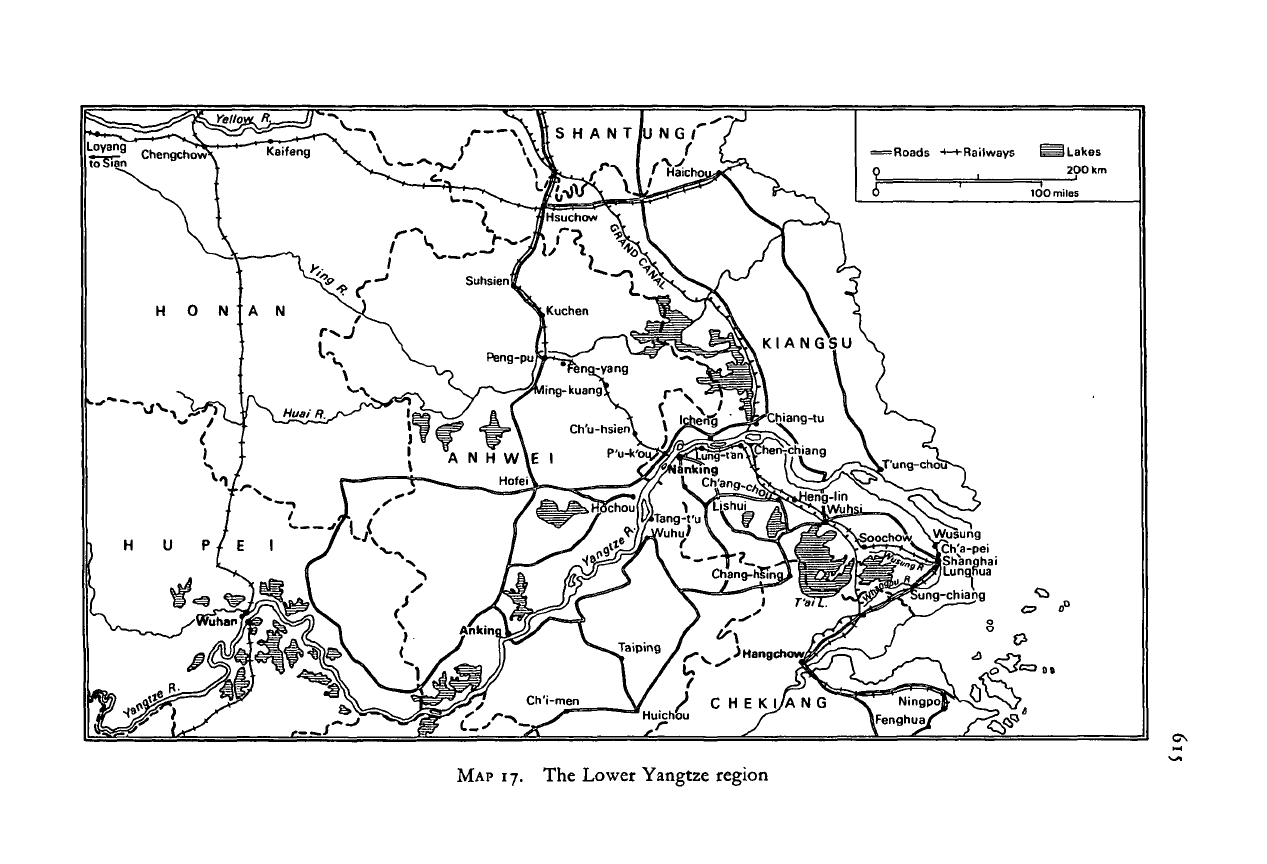
^Roads ••—t-Raitways
1 Lakes
200 km
MAP
17. The Lower Yangtze region
Cambridge Histories Online © Cambridge University Press, 2008

6l6 THE NATIONALIST REVOLUTION, I923-8
were positioned only
a
few miles from Shanghai under front commander
Pai Ch'ung-hsi, while Ho Ying-ch'in's army was ready to press northward
on both sides
of
Lake
Tai to cut the
Shanghai-Nanking Railway,
the
main escape route
for
Sun Ch'uan-fang's remnants and the fresh Shantung
troops under General
Pi
Shu-ch'eng.
The
commander
of the
Chinese
fleet at Shanghai, Admiral Yang Shu-chuang,
had
long been negotiating
with
the
Kuomintang through
its
chief representative
in
Shanghai,
Niu
Yung-chien.
On 14
March Admiral Yang declared
his
flotilla
for the
Nationalists; he had already sent three vessels up the Yangtze to Kiukiang
for Chiang Kai-shek's use. Preliminary battles in the third week of March,
and strikes and sabotage on his railway lines, made
it
imperative for Chang
Tsung-ch'ang
to
withdraw
his
troops towards Nanking
or
face entrap-
ment.
On
18
March
a
Nationalist attack broke the Sungkiang front and nor-
thern troops retreated into Shanghai, but not into the foreign settlements
which were protected by a multi-national army manning barricades
at all
entrances.
Pi
Shu-ch'eng negotiated
his own
surrender, gave
the
battle
plans
to Niu
Yung-chien,'
!
° then escaped
by
Japanese ship
to
Tsingtao
and made his way
to
Tsinan, where he was apprehended and executed.
On 21 March,
a
Monday,
as Pai
Ch'ung-hsi's forces approached
the
city's southern outskirts,
the
General Labour Union began
the
'third
uprising'.
By now the
Workers' Inspections Corps numbered some
3,000, trained
by
Whampoa cadets,
and
some armed with rifles
and
pistols. Some guerrilla groups had also infiltrated
the
city, and intimida-
tion squads
—
called 'black gowned gunmen'
in
Western reports
—
were
active again.
The
uprising started
at
noon with pickets
and
gunmen
attacking police
on
the streets, capturing police stations
in
sections
of
the
Chinese cities,
and
seizing arms. Simultaneously thousands
of
workers
came
out on a
general strike, enforced where necessary, although
the
atmosphere was one
of
celebration and welcome
for
the National Revolu-
tionary Army.
The
city was filled with Nationalist flags. After
a
day
of
fighting in
a
very confused situation,
it
appeared that
a
communist-
organized underground force with support from the masses had liberated
the Chinese cities, although
the
amount
of
joint planning with
Kuo-
mintang agents
is
unclear. Some four
to
five thousand northern troops
still were concentrated
in
Chapei near
the
North Station
on the
railway
leading
to
Nanking. According
to
contemporary reports there was much
looting, arson
and
killing, some
by
northern troops
and
some
by the
irregular forces which had seized parts of the city. Probably some of these
150 Ch'en Hsun-cheng, 'The capture
of
Chekiang and Shanghai'
in
KMWH,
14. 2231-309,
p.
2288
on
Pi's defection.
Cambridge Histories Online © Cambridge University Press, 2008
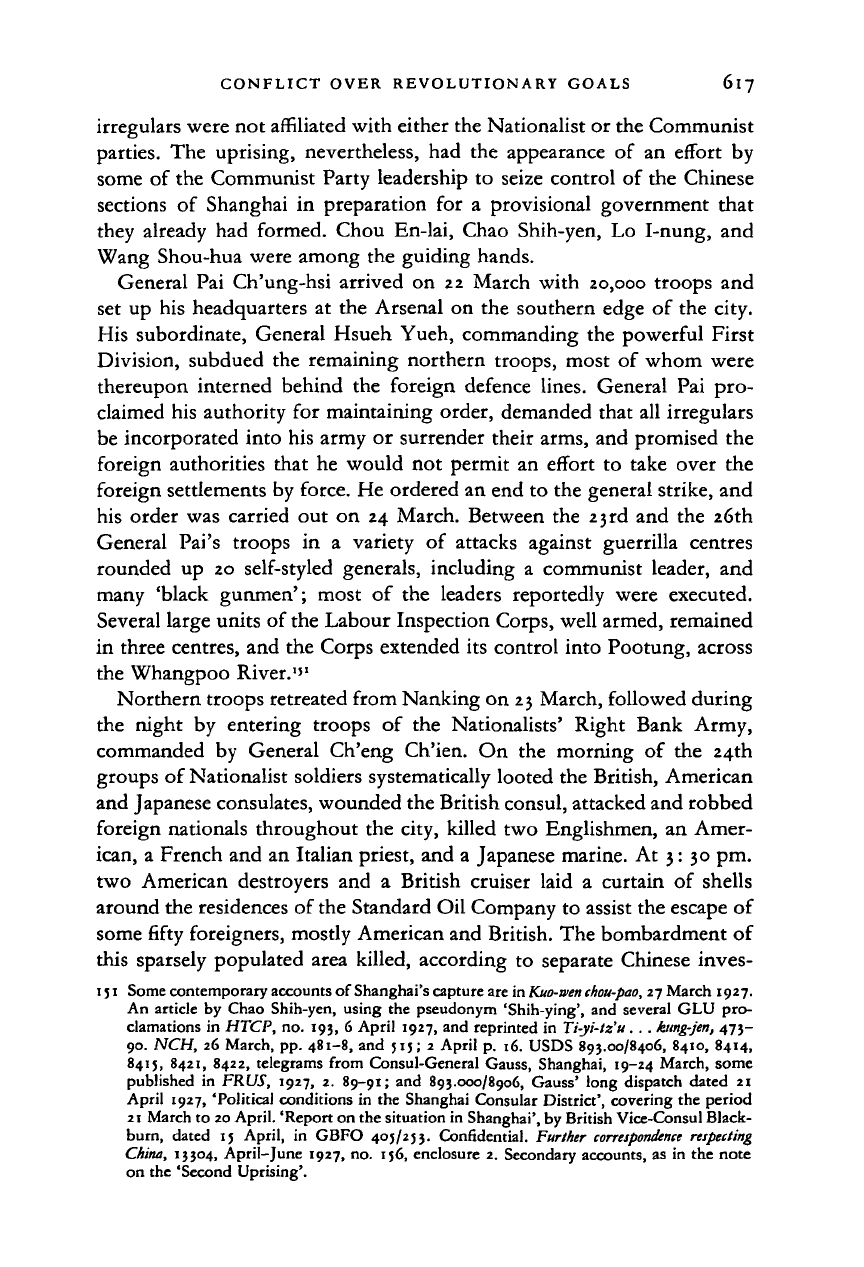
CONFLICT OVER REVOLUTIONARY GOALS 6lJ
irregulars were not affiliated with either the Nationalist or the Communist
parties.
The
uprising, nevertheless,
had the
appearance
of an
effort
by
some
of
the Communist Party leadership
to
seize control
of
the Chinese
sections
of
Shanghai
in
preparation
for a
provisional government that
they already
had
formed. Chou En-lai, Chao Shih-yen,
Lo
I-nung,
and
Wang Shou-hua were among the guiding hands.
General
Pai
Ch'ung-hsi arrived
on 22
March with 20,000 troops
and
set
up
his headquarters
at the
Arsenal
on the
southern edge
of
the city.
His subordinate, General Hsueh Yueh, commanding
the
powerful First
Division, subdued
the
remaining northern troops, most
of
whom were
thereupon interned behind
the
foreign defence lines. General
Pai pro-
claimed his authority
for
maintaining order, demanded that all irregulars
be incorporated into his army
or
surrender their arms, and promised
the
foreign authorities that
he
would
not
permit
an
effort
to
take over
the
foreign settlements by force. He ordered an end to the general strike, and
his order was carried
out on 24
March. Between
the
23 rd
and the
26th
General Pai's troops
in a
variety
of
attacks against guerrilla centres
rounded
up 20
self-styled generals, including
a
communist leader,
and
many 'black gunmen'; most
of the
leaders reportedly were executed.
Several large units of the Labour Inspection Corps, well armed, remained
in three centres, and the Corps extended its control into Pootung, across
the Whangpoo River.
1
'
1
Northern troops retreated from Nanking on
23
March, followed during
the night
by
entering troops
of the
Nationalists' Right Bank Army,
commanded
by
General Ch'eng Ch'ien.
On the
morning
of the
24th
groups
of
Nationalist soldiers systematically looted the British, American
and Japanese consulates, wounded the British consul, attacked and robbed
foreign nationals throughout the city, killed two Englishmen,
an
Amer-
ican,
a
French and
an
Italian priest, and
a
Japanese marine.
At
3: 30 pm.
two American destroyers
and a
British cruiser laid
a
curtain
of
shells
around the residences of the Standard Oil Company
to
assist the escape of
some fifty foreigners, mostly American and British. The bombardment of
this sparsely populated area killed, according
to
separate Chinese inves-
151 Some contemporary accounts of Shanghai's capture are in
Kuo-aen
chou-pao,
27 March 1927.
An article
by
Chao Shih-yen, using
the
pseudonym 'Shih-ying', and several GLU
pro-
clamations
in
HTCP, no. 193,
6
April 1927, and reprinted
in
Ti-yi-tz'u.
. .
kung-jen,
473-
90.
NCH, 26
March, pp. 481-8, and 515;
2
April
p. 16.
USDS 895.00/8406, 8410, 8414,
8415,
8421, 8422, telegrams from Consul-General Gauss, Shanghai, 19-24 March, some
published
in
FRUS, 1927,
2.
89-91;
and
893.000/8906, Gauss' long dispatch dated
21
April 1927, 'Political conditions
in the
Shanghai Consular District', covering the period
21 March to 20 April. 'Report on the situation in Shanghai', by British Vice-Consul Black-
burn, dated
15
April,
in
GBFO 405/253. Confidential. Further
correspondence
respecting
China, 13304, April-June 1927, no. 156, enclosure
2.
Secondary accounts,
as in the
note
on the 'Second Uprising'.
Cambridge Histories Online © Cambridge University Press, 2008
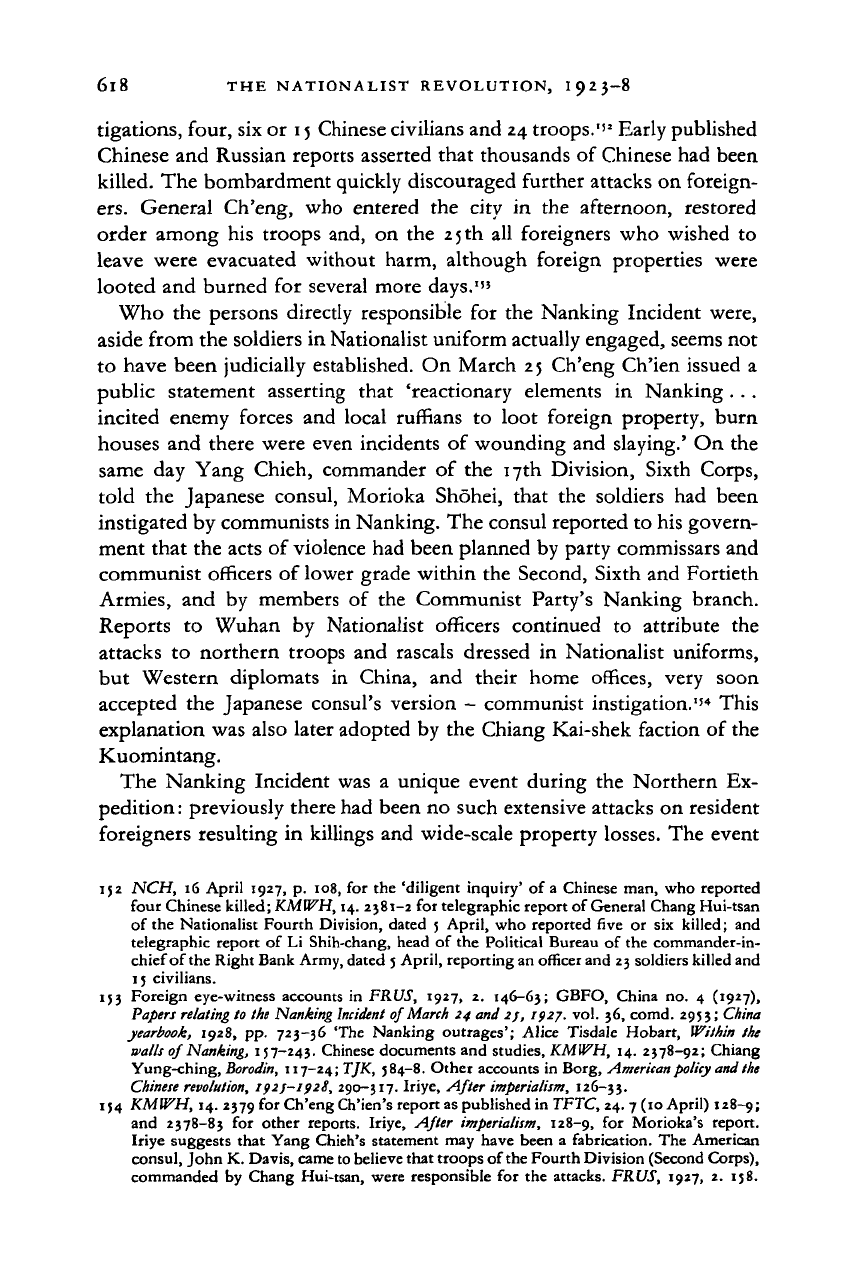
6l8 THE NATIONALIST REVOLUTION, I 9
2
3-8
tigations, four,
six or
15 Chinese civilians
and
24 troops.
I!2
Early published
Chinese
and
Russian reports asserted that thousands
of
Chinese
had
been
killed.
The
bombardment quickly discouraged further attacks
on
foreign-
ers.
General Ch'eng,
who
entered
the
city
in
the
afternoon, restored
order among
his
troops
and, on the
25
th
all
foreigners
who
wished
to
leave were evacuated without harm, although foreign properties were
looted
and
burned
for
several more days."
5
Who
the
persons directly responsible
for the
Nanking Incident were,
aside from
the
soldiers
in
Nationalist uniform actually engaged, seems
not
to have been judicially established.
On
March
25
Ch'eng Ch'ien issued
a
public statement asserting that 'reactionary elements
in
Nanking
.
. .
incited enemy forces
and
local ruffians
to
loot foreign property, burn
houses
and
there were even incidents
of
wounding
and
slaying.'
On the
same
day
Yang Chieh, commander
of
the 17th
Division, Sixth Corps,
told
the
Japanese consul, Morioka Shohei, that
the
soldiers
had
been
instigated
by
communists
in
Nanking.
The
consul reported
to his
govern-
ment that
the
acts
of
violence
had
been planned
by
party commissars
and
communist officers
of
lower grade within
the
Second, Sixth
and
Fortieth
Armies,
and
by
members
of
the
Communist Party's Nanking branch.
Reports
to
Wuhan
by
Nationalist officers continued
to
attribute
the
attacks
to
northern troops
and
rascals dressed
in
Nationalist uniforms,
but Western diplomats
in
China,
and
their home offices, very soon
accepted
the
Japanese consul's version
-
communist instigation.
1
'
4
This
explanation
was
also later adopted
by the
Chiang Kai-shek faction
of the
Kuomintang.
The Nanking Incident
was
a
unique event during
the
Northern
Ex-
pedition
:
previously there
had
been
no
such extensive attacks
on
resident
foreigners resulting
in
killings
and
wide-scale property losses.
The
event
152
NCH,
16 April 1927,
p.
108,
for
the 'diligent inquiry'
of
a Chinese man, who reported
four Chinese killed;
KMVPH,
14. 2381-2 for telegraphic report of General Chang Hui-tsan
of the Nationalist Fourth Division, dated 5 April, who reported five
or six
killed;
and
telegraphic report
of
Li Shih-chang, head
of
the Political Bureau
of
the commander-in-
chief of the Right Bank Army, dated
5
April, reporting an officer and 23 soldiers killed and
15 civilians.
153 Foreign eye-witness accounts
in
FRUS, 1927,
2.
146-63;
GBFO, China
no. 4
(1927),
Papers relating
to the
Nanking
Incident
of
March
24 and
2f,
1927. vol. 36,
comd.
295
3; China
yearbook, 1928,
pp.
723-36
'The
Nanking outrages'; Alice Tisdale Hobart, Within the
malls
of Nanking,
157-243.
Chinese documents and studies,
KMWH,
14. 2378-92; Chiang
Yung-ching,
Borodin,
117-24; TJK,
584-8.
Other accounts in Borg,
American policy
and
the
Chinese
revolution,
192J-1928, 290-317. Iriye, After
imperialism,
126-33.
154
KMWH,
14. 2379 for Ch'eng Ch'ien's report as published in TFTC, 24. 7 (10 April) 128-9;
and 2378-83
for
other reports. Iriye, After imperialism, 128-9,
f°
r
Morioka's report.
Iriye suggests that Yang Chieh's statement may have been
a
fabrication. The American
consul, John K. Davis, came to believe that troops of the Fourth Division (Second Corps),
commanded
by
Chang Hui-tsan, were responsible
for the
attacks. FRUS, 1927,
2. 158.
Cambridge Histories Online © Cambridge University Press, 2008

CONFLICT OVER REVOLUTIONARY GOALS 619
created an atmosphere of crisis in the foreign settlements in Shanghai.
In Peking the British, American, Japanese, French and Italian ministers
consulted among themselves and with their governments concerning
reprisals. They reached agreement on a set of demands for retribution but
their governments could not agree on sanctions if apologies from the
Nationalist government and punishments of those guilty were not
forthcoming. The Japanese government under the influence of Foreign
Minister Shidehara Kijuro, attempted to restrain Great Britain and the
other powers from too bellicose a posture, while at the same time hoping
to persuade Chiang Kai-shek and the other moderate leaders of the Kuo-
mintang 'to solve the present issue and eventually stabilize conditions
throughout the south.' In short, Chiang was to be encouraged to act
against the radicals in his party. The Japanese consul-general in Shanghai,
Yada Shichitaro, passed this advice to Chiang Kai-shek through his close
associate, Huang Fu. The British government's policy towards the
Nationalists hardened. Great Britain now had the power in place to ex-
ecute a variety of punishments, but the American government would not
consent to participate in sanctions. In the end, after protracted interna-
tional debate, the powers did not take direct sanctions: developments in
the power struggle within the Kuomintang superseded such ideas.
1
"
The Wuhan government was at first poorly informed on the Nanking
Incident. The foreign minister, Eugene Chen, learned the details of what
had happened to the foreign community in Nanking from Eric Teichman,
the British representative in Hankow, with confirmation from the
American and Japanese consuls. Not until i April did the Political
Council, now fully informed about the Incident and with some inkling
as to reaction in foreign capitals, consider seriously how to deal with
the situation. Great Britain and America, it appeared, were preparing to
intervene, while Japan's policy was still unclear. Borodin put the matter
bluntly - 'if the imperialists should actually help the counter-revolu-
tionaries, it could bring about the destruction of the Revolutionary
Army.' His proposals were rather familiar: divide Great Britain and Japan.
This could be done by allaying Japanese fears of the revolution and by
ensuring that Japanese in China were protected, particularly in Hankow
where, according to Eugene Chen, Japanese residents were fearful their
concession would be seized. Propaganda laying the blame for the Nanking
Incident upon imperialism, and with moral appeals, should be addressed
155 Iriye, After
imperialism,
130-3, describes Shidehara's policy and instructions to his officials
in China, based on Japanese Foreign Office documents. Wilson, 'Great Britain and the
Kuomintang', 575-91 describes the British reaction based on British Foreign Office and
Cabinet documents. American policy is covered in FRUS, 1927, 2. 164-236; and in Borg,
American policy and the Chinese revolution, 296—317.
Cambridge Histories Online © Cambridge University Press, 2008
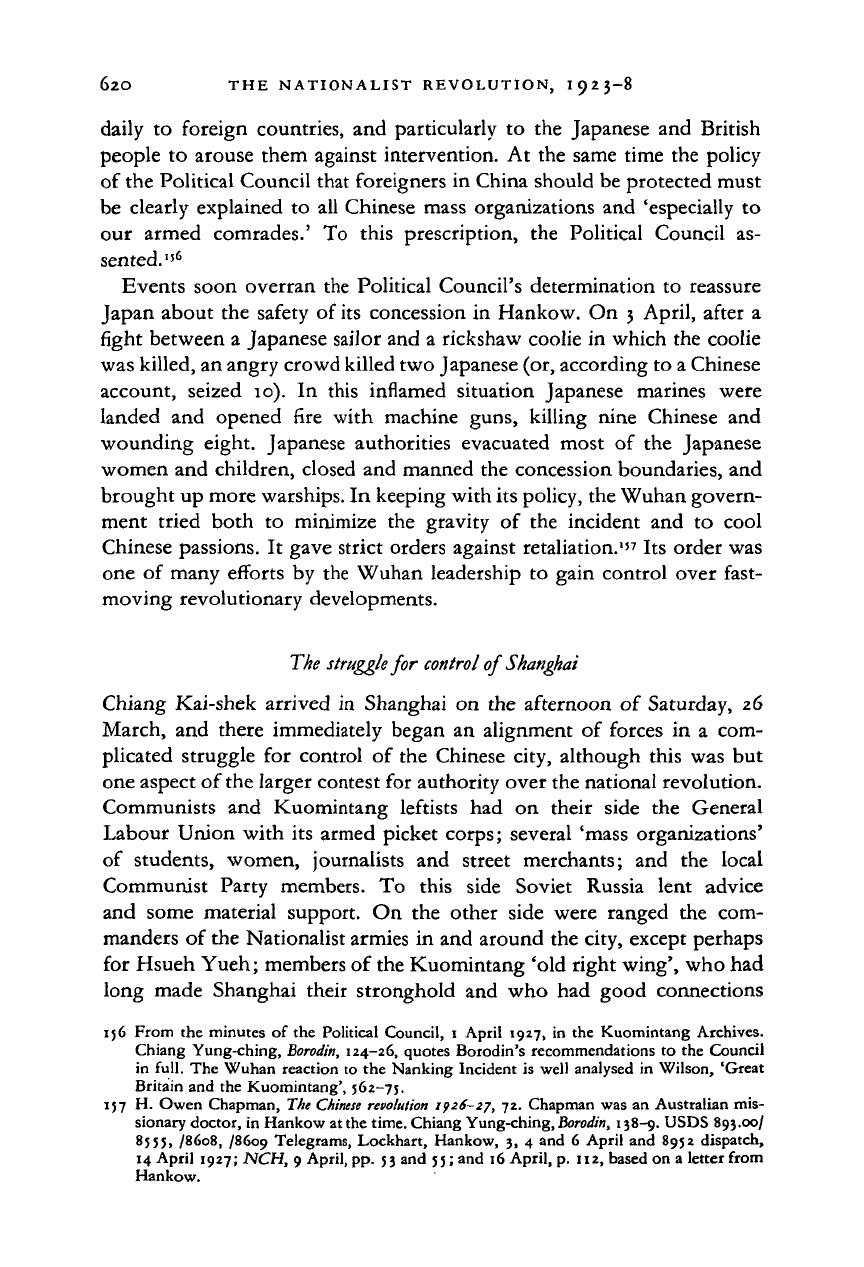
620 THE NATIONALIST REVOLUTION, I923-8
daily
to
foreign countries,
and
particularly
to
the
Japanese
and
British
people
to
arouse them against intervention.
At the
same time
the
policy
of the Political Council that foreigners
in
China should
be
protected must
be clearly explained
to
all
Chinese mass organizations
and
'especially
to
our armed comrades.'
To
this prescription,
the
Political Council
as-
sented.
1
'
6
Events soon overran
the
Political Council's determination
to
reassure
Japan about
the
safety
of
its concession
in
Hankow.
On 3
April, after
a
fight between
a
Japanese sailor
and a
rickshaw coolie
in
which
the
coolie
was killed,
an
angry crowd killed
two
Japanese (or, according
to a
Chinese
account, seized
10).
In
this inflamed situation Japanese marines were
landed
and
opened fire with machine guns, killing nine Chinese
and
wounding eight. Japanese authorities evacuated most
of
the
Japanese
women
and
children, closed
and
manned
the
concession boundaries,
and
brought
up
more warships.
In
keeping with its policy,
the
Wuhan govern-
ment tried both
to
minimize
the
gravity
of
the
incident
and
to
cool
Chinese passions.
It
gave strict orders against retaliation.
1
'
7
Its
order
was
one
of
many efforts
by the
Wuhan leadership
to
gain control over fast-
moving revolutionary developments.
The struggle for
control
of
Shanghai
Chiang Kai-shek arrived
in
Shanghai
on the
afternoon
of
Saturday,
26
March,
and
there immediately began
an
alignment
of
forces
in a
com-
plicated struggle
for
control
of
the
Chinese city, although this
was but
one aspect
of
the larger contest
for
authority over the national revolution.
Communists
and
Kuomintang leftists
had on
their side
the
General
Labour Union with
its
armed picket corps; several 'mass organizations'
of students, women, journalists
and
street merchants;
and the
local
Communist Party members.
To
this side Soviet Russia lent advice
and some material support.
On
the
other side were ranged
the
com-
manders
of the
Nationalist armies
in and
around
the
city, except perhaps
for Hsueh Yueh; members
of
the Kuomintang
'old
right wing',
who had
long made Shanghai their stronghold
and who had
good connections
156 From the minutes
of
the Political Council,
i
April 1927,
in the
Kuomintang Archives.
Chiang Yung-ching,
Borodin,
124-26, quotes Borodin's recommendations
to
the Council
in full. The Wuhan reaction
to
the Nanking Incident
is
well analysed
in
Wilson, 'Great
Britain and the Kuomintang', 562-75.
157
H.
Owen Chapman, The
Chinese revolution
1926-27, 72. Chapman was
an
Australian mis-
sionary doctor, in Hankow at the time. Chiang Yung-ching,
Borodin,
138-9. USDS 893.00/
8555,
/8608, /8609 Telegrams, Lockhart, Hankow,
3, 4
and
6
April and 8952 dispatch,
14 April 1927;
NCH, 9
April, pp. 53 and 55; and 16 April, p. 112, based on
a
letter from
Hankow.
Cambridge Histories Online © Cambridge University Press, 2008
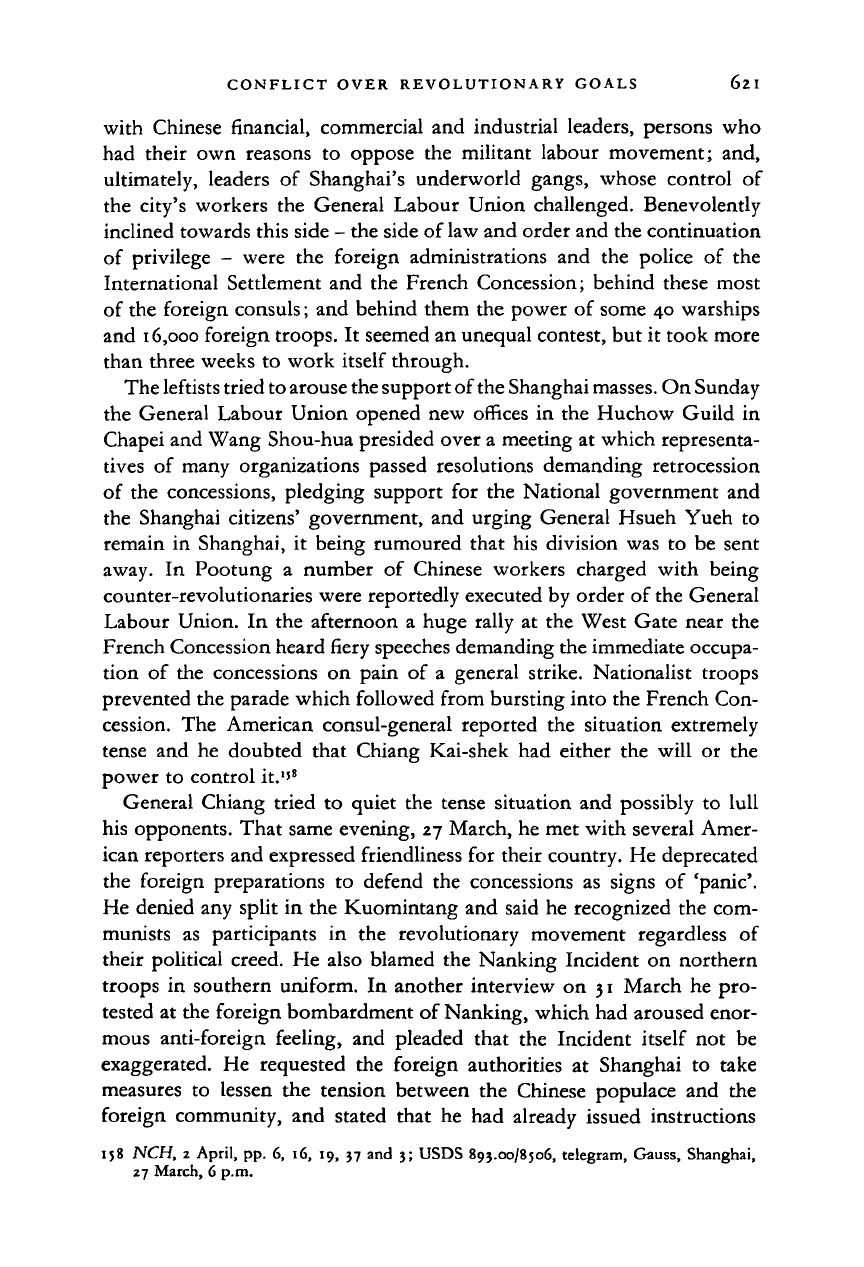
CONFLICT OVER REVOLUTIONARY GOALS 621
with Chinese financial, commercial and industrial leaders, persons who
had their own reasons to oppose the militant labour movement; and,
ultimately, leaders of Shanghai's underworld gangs, whose control of
the city's workers the General Labour Union challenged. Benevolently
inclined towards this side - the side of law and order and the continuation
of privilege - were the foreign administrations and the police of the
International Settlement and the French Concession; behind these most
of the foreign consuls; and behind them the power of some 40 warships
and 16,000 foreign troops. It seemed an unequal contest, but it took more
than three weeks to work itself through.
The leftists tried to arouse the support of the Shanghai
masses.
On Sunday
the General Labour Union opened new offices in the Huchow Guild in
Chapei and Wang Shou-hua presided over a meeting at which representa-
tives of many organizations passed resolutions demanding retrocession
of the concessions, pledging support for the National government and
the Shanghai citizens' government, and urging General Hsueh Yueh to
remain in Shanghai, it being rumoured that his division was to be sent
away. In Pootung a number of Chinese workers charged with being
counter-revolutionaries were reportedly executed by order of the General
Labour Union. In the afternoon a huge rally at the West Gate near the
French Concession heard fiery speeches demanding the immediate occupa-
tion of the concessions on pain of a general strike. Nationalist troops
prevented the parade which followed from bursting into the French Con-
cession. The American consul-general reported the situation extremely
tense and he doubted that Chiang Kai-shek had either the will or the
power to control it.
1
'
8
General Chiang tried to quiet the tense situation and possibly to lull
his opponents. That same evening, 27 March, he met with several Amer-
ican reporters and expressed friendliness for their country. He deprecated
the foreign preparations to defend the concessions as signs of 'panic'.
He denied any split in the Kuomintang and said he recognized the com-
munists as participants in the revolutionary movement regardless of
their political creed. He also blamed the Nanking Incident on northern
troops in southern uniform. In another interview on 31 March he pro-
tested at the foreign bombardment of Nanking, which had aroused enor-
mous anti-foreign feeling, and pleaded that the Incident itself not be
exaggerated. He requested the foreign authorities at Shanghai to take
measures to lessen the tension between the Chinese populace and the
foreign community, and stated that he had already issued instructions
158 NCH, 2 April, pp. 6, 16, 19, 37 and 3; USDS 893.00/8506, telegram, Gauss, Shanghai,
27 March, 6 p.m.
Cambridge Histories Online © Cambridge University Press, 2008
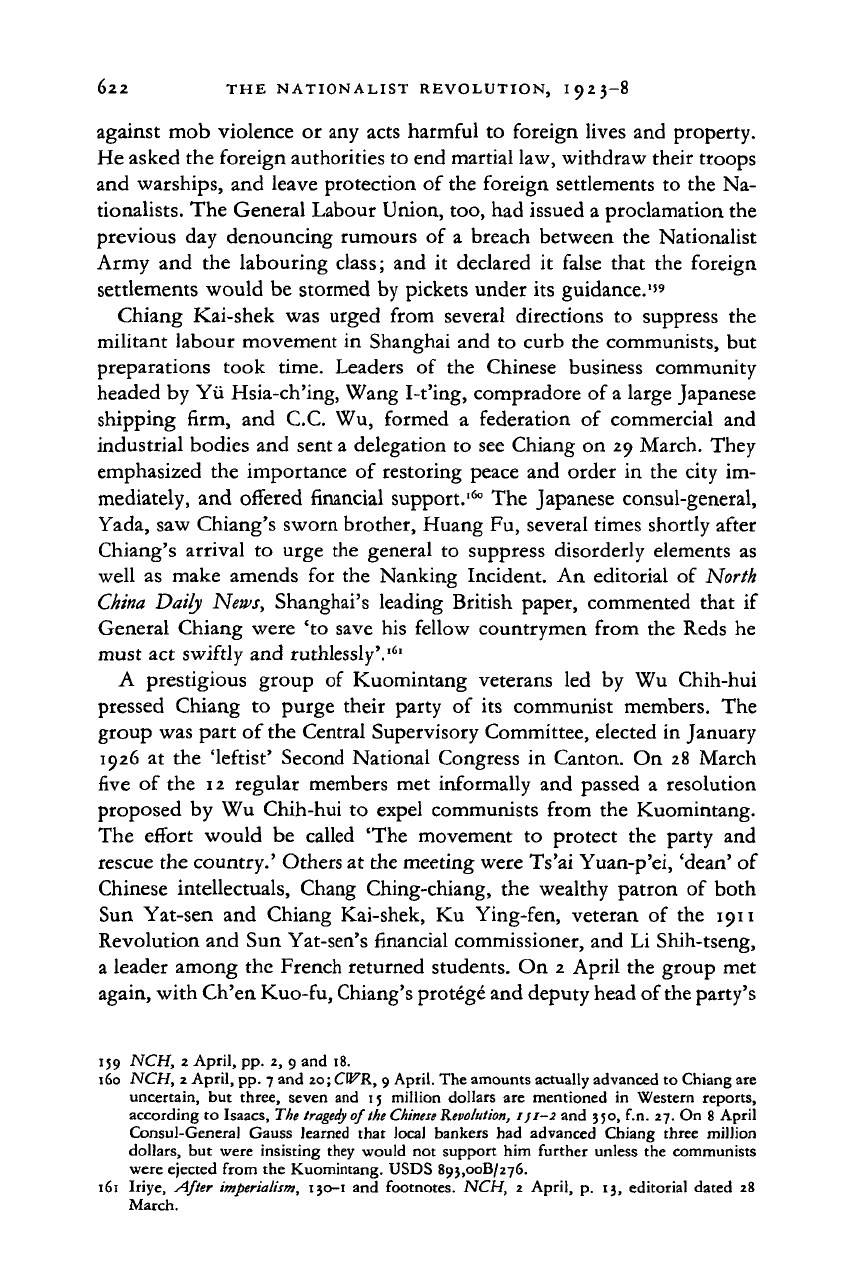
622 THE NATIONALIST REVOLUTION, I923-8
against
mob
violence
or any
acts harmful
to
foreign lives
and
property.
He asked
the
foreign authorities
to end
martial law, withdraw their troops
and warships,
and
leave protection
of
the foreign settlements
to the Na-
tionalists.
The
General Labour Union,
too, had
issued
a
proclamation
the
previous
day
denouncing rumours
of a
breach between
the
Nationalist
Army
and the
labouring class;
and
it
declared
it
false that
the
foreign
settlements would
be
stormed
by
pickets under
its
guidance.
1
'
9
Chiang Kai-shek
was
urged from several directions
to
suppress
the
militant labour movement
in
Shanghai
and
to
curb
the
communists,
but
preparations took time. Leaders
of the
Chinese business community
headed
by Yii
Hsia-ch'ing, Wang I-t'ing, compradore
of
a large Japanese
shipping firm,
and
C.C. Wu,
formed
a
federation
of
commercial
and
industrial bodies
and
sent
a
delegation
to see
Chiang
on 29
March. They
emphasized
the
importance
of
restoring peace
and
order
in
the
city
im-
mediately,
and
offered financial support.'
6
"
The
Japanese consul-general,
Yada,
saw
Chiang's sworn brother, Huang
Fu,
several times shortly after
Chiang's arrival
to
urge
the
general
to
suppress disorderly elements
as
well
as
make amends
for the
Nanking Incident.
An
editorial
of
North
China Daily News, Shanghai's leading British paper, commented that
if
General Chiang were
'to
save
his
fellow countrymen from
the
Reds
he
must
act
swiftly
and
ruthlessly'.
l6
'
A prestigious group
of
Kuomintang veterans
led by
Wu
Chih-hui
pressed Chiang
to
purge their party
of
its
communist members.
The
group
was
part
of
the Central Supervisory Committee, elected
in
January
1926
at
the
'leftist' Second National Congress
in
Canton.
On 28
March
five of
the 12
regular members
met
informally
and
passed
a
resolution
proposed
by Wu
Chih-hui
to
expel communists from
the
Kuomintang.
The effort would
be
called
'The
movement
to
protect
the
party
and
rescue
the
country.' Others
at the
meeting were Ts'ai Yuan-p'ei, 'dean'
of
Chinese intellectuals, Chang Ching-chiang,
the
wealthy patron
of
both
Sun Yat-sen
and
Chiang Kai-shek,
Ku
Ying-fen, veteran
of
the 1911
Revolution
and Sun
Yat-sen's financial commissioner,
and Li
Shih-tseng,
a leader among
the
French returned students.
On 2
April
the
group
met
again, with Ch'en Kuo-fu, Chiang's protege and deputy head of the party's
159
NCH,
2 April, pp. 2,
9
and 18.
160
NCH,
2 April, pp. 7 and 20; CWK, 9 April. The amounts actually advanced to Chiang are
uncertain,
but
three, seven
and 15
million dollars
are
mentioned
in
Western reports,
according
to
Isaacs, The
tragedy
of
the Chinese
Revolution,
IJI-2
and 350, f.n. 27. On 8 April
Consul-General Gauss learned that local bankers
had
advanced Chiang three million
dollars,
but
were insisting they would
not
support him further unless
the
communists
were ejected from the Kuomintang. USDS 893,008/276.
161 Iriye, After
imperialism,
130-1
and
footnotes.
NCH, 2
April,
p.
13, editorial dated
28
March.
Cambridge Histories Online © Cambridge University Press, 2008
